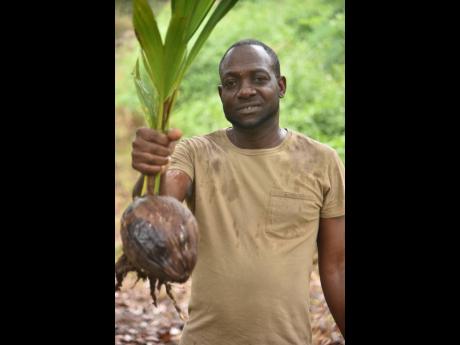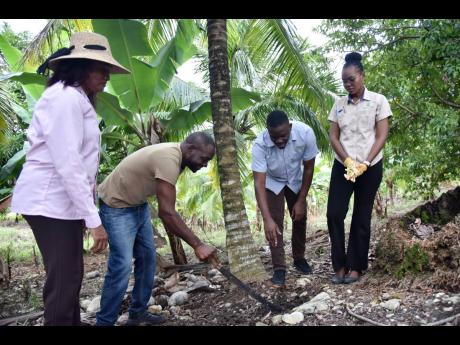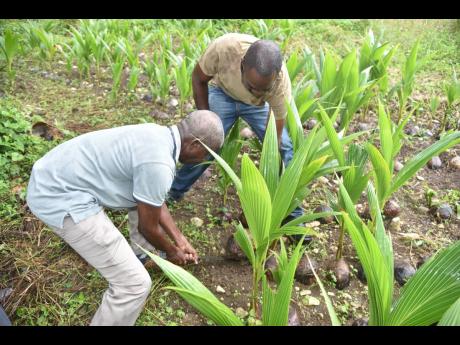Farmer overjoyed as coconut farm rebounds
After years of poor yields, venture springs back to life with CARDI, Newport-Fersan support
Farmer Devon Fuller vividly remembers being stumped after three acres of his coconut plantation failed to yield quality coconuts after three years and, in some cases, no coconuts for a four-year period.
He believes that he would have lost his coconut farm if it were not for the guidance and joint assistance from the Caribbean Agricultural Research Development Institute (CARDI) and Newport-Fersan Jamaica Limited.
Fuller was among a group of farmers from Wilmington district in St Thomas, who benefited from best practices in a series of training sessions held by both organisations.
He told The Gleaner that even though he would regularly check on his crops, because he had no knowledge of how to identify various pests, he was not aware that his plants were plagued with coconut mites ( Aceria guerreronis).
“I used to wonder what happen to these coconuts ... until they came in and showed me that, ‘Hey, you have coconut mite’, and from they showed me how to control it and clean the roots and take care of it, I see good result from it,” Fuller explained.
“Two weeks ago, I reaped from one tree 20 good-size coconuts. I couldn’t believe!” he exclaimed, grinning enthusiastically at the sudden shift in his crop yields.
Fuller also praised Newport-Fersan’s involvement, pointing out that after soil testing revealed the nutrients which were lacking in his farm.
After analysing the results, Newport-Fersan agronomist Danavan Pryce helped him to craft a customised fertiliser blend to be used specifically on his farm to help increase productivity and the general health of the land.
This, Fuller said, has led to better outcomes on his farm and an increase in coconut revenue.
The intervention falls under the Coconut Industry Development for the Caribbean Partnership, which is funded by the European Union.
It was undertaken to revitalise and sustainably develop the coconut industry as well as to contribute to Caribbean region’s economy and to enhance livelihoods.
Some €3.5 million (approximately J$570 million) was provided for the project’s first phase, which ran from 2015 to 2018. The second phase, which is still ongoing, commenced in July 2019 and is expected to end April 2024. The EU and the Caribbean Forum of African, Caribbean, and Pacific Group of States provided funding totalling over €5 million (J$839 million) for this phase.
CARDI partnered with the Geneva-based International Trade Centre and the EU to carry out the project.
Other local partners include the Coconut Industry Board, the Scientific Research Council, and Knockalva Polytechnic College.
“The project has had a significant impact on small holder farmers and micro, small and medium-size enterprises (MSMEs) in the coconut industry,” Desireina Delancy, coconut technician at CARDI, informed The Gleaner.
Among the other activities conducted under the project is the establishment of a coconut nursery at each farm visited, where coconut seed nuts having a high resistance to lethal yellowing and other diseases are planted. After a four to six-month period and the seeds have germinated, the farmers are given some of the seedlings for free.
Delancy further explained that under the project’s second phase, the CARDI Jamaica team has distributed more than 10,680 seedlings (equivalent to approximately 133 acres/59 hectares) from 13 nurseries to over 200 farmers, mainly from St Catherine, St Thomas, St Mary, Portland, Hanover, Trelawny, and Westmoreland.
In Wilmington district, the coconut seed nuts had germinated after being planted slightly diagonally some months ago to ensure best germination rate.
“This nursery really is an incubator. So, you’ll basically use this nursery set-up to sow the seed nuts, and in 46 months time, you would hope that the seed nut will germinate to a seedling. When the seedling itself is at six months, it is at a stage where it can stand on its own,” Delancy explained.
To make room for the plant’s permanent root system, the nut’s roots are cut off when they are moved from the nursery on to the farm.
Delancy informed The Gleaner that the second phase of the project is aimed to enhance the competitiveness of small-scale farmers in coconut value chains, through more sustainable production and commercialisation performance and better local, regional, and global market integration.
This, she said, involved implementing an integrated and coordinated approach that results in enhanced competitiveness and resilience for the farmers, MSMEs and vector control operators involved in coconut and associated crop value chains.



